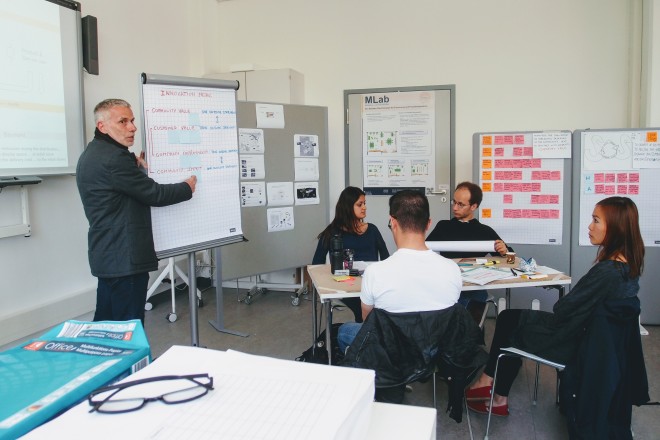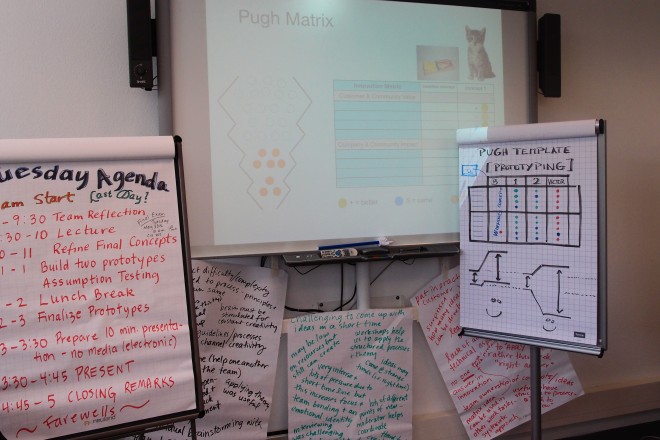Lorena Gutierrez Castro, well-known of her positive energy and active participation in in-class activities, is our current third semester student from Colombia. She joined the MBA International Management program at HfWU in the winter semester 2016. Being a globetrotter, Lorena speaks four languages (Spanish, German, English and French) and has been living a truly international life. Not only has she studied and worked in Germany and France, after obtaining her bachelor degree in finance and economics, she decided to come back to Germany to pursue her MBA studies in International Management. Here is Lorena’s story.
Q1: Why did you choose this MBA International Management program, and how did you discover it at the first place?
A1: Back in 2008, I have attended 11 months of classes in a high school in Germany. Because of the high quality education, I always wanted to come back to Germany to continue my studies. Later on, I have established my goal to pursue an MBA, so I started to do my research and found this program on the German Academic Exchange Service (DAAD) website.
Q2: How was your preparation for your studies/application?
A2: In order to fulfill the requirements, I prepared for the German and English language tests (TestDaf and Toefl) all by myself, which was quite challenging but manageable. Another challenging part is to collect all the required documents, such as the recommendation letter and certificates to prove my previous work and studies experience from my professors and manager. It took quite a long time to get everything prepared.
Q3: What do you enjoy the most in this MBA program?
A3: I really like that we had an overview of different areas in business management in the first semester, then the theories and knowledge can be applied in the international and social contexts. I also appreciate HfWU’s emphasis on sustainability. From the classes we always learn about how business management can be integrated in the sustainable development of the society. For example, I have chosen “Social Entrepreneurship” as my elective course. As my ambition is to develop my own social projects in Colombia after my graduation, the class has really helped me understand the planning, resources management and operation of a social enterprise.
I also enjoy the international environment as the students in my class come from all over the world. Our university is quite small, but exactly because of this students have close interactions with one another. It´s an enriching experience as I learn a lot from our daily interactions with my fellow classmates.
Q4: Have you encountered any challenges during your studies? What are they and how do you overcome them?
A4: The assessment method here is quite different from in Colombia. In Colombia, we have more continuous assessments i.e. mid-term exams. Here the final exam plays the most important role in the assessment. The workload is quite heavy as we approach the end of the semester. I find it better to prepare for exams in solidarity – that is to learn in a study group. It is good to help each other and it feels less stressful because we tackle the challenge together instead of doing everything alone.
Q5: Do you have any recommendations how the program can be further enhanced?
A5: I would prefer more elective courses because I have already done my previous studies in business. In my opinion, a more flexible program can allow students like me, who come from a business background, to have more opportunities and time to learn and explore new areas of studies.
Q6: Do you have any tips or advice to share with the future applicants?
A6: HfWU is situated in an advantageous location, as Baden Württemberg is one of the key economic backbones and business areas of Germany. I think students should take advantage of the plentiful opportunities in the surrounding areas.

Lorena’s advice to candidates:
To prepare for your application, I believe that it is important to write your motivation letter genuinely, for example, about what your ambitions are and why you find this MBA program suitable. I would recommend candidates to read their motivation letters again before attending the interview. This helps you stay relevant and consistent in the conversation. It is also helpful to read the website of HfWU to get familiar with the course structure and content, so you are prepared to answer questions like “why do you choose this study program”.





















